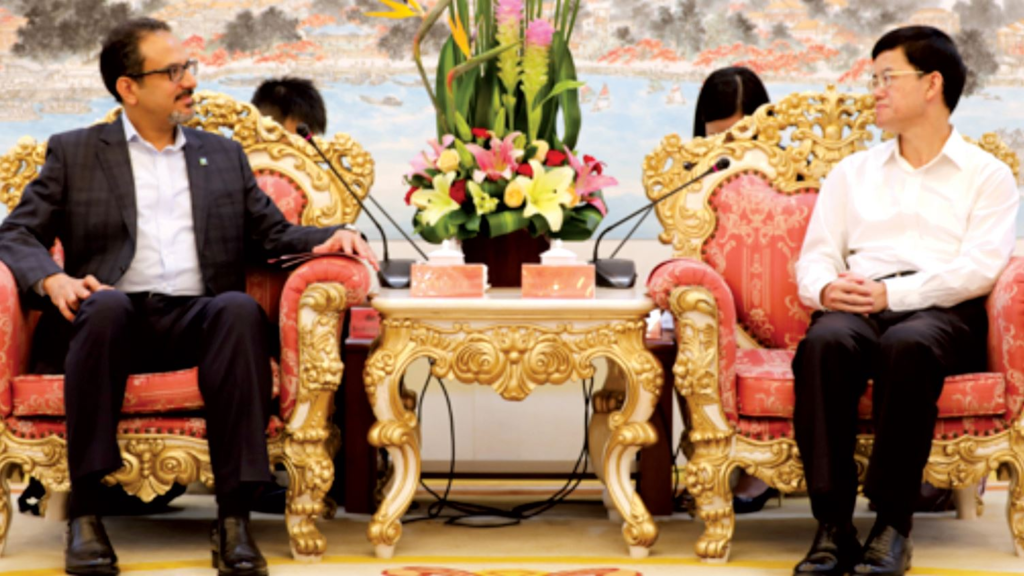Aramco Asia eyes intensified downstream engagement with local governments

Aramco Asia has pledged to increase efforts to expand engagement in the downstream business with the Chinese provinces of Fujian and Yunnan, as part of the company’s commitment to promote regional economic growth and ensure energy security.
The move is considered the latest endeavor under Aramco Asia’s business plan to support the flow of reciprocal investments between China and Saudi Arabia, in line with Saudi Vision 2030 and China’s “Belt and Road” Initiative.
“We plan to upgrade our downstream chemical business by building a chemical hub to distribute products from our operations in this region,” said Aramco Asia president and CEO Nabil A. Al-Nuaim. “Xiamen is one of the prime candidates for this chemical hub as we can leverage the benefits from China’s Free Trade Zone (FTZ) initiative.”
Al-Nuaim made the remarks while meeting with Pei Jinjia, secretary of the Communist Party of the China Xiamen Municipal Committee, in Xiamen — a coastal city in southeast China’s Fujian Province — where the company’s chemical sales office is based. Xiamen is also in close proximity to FREP, the refining and petrochemical joint venture in which Aramco holds a 25% share.
“Considering the strong alignment between the Belt and Road initiative and Saudi Vision 2030, our two countries have made significant progress toward strategic partnerships, including the development of a special industrial park for Chinese investors in Jazan Economic City. Xiamen can play an important part in this development, given its role in the Maritime Silk Road,” Al-Nuaim added.
From the Xiamen chemical sales office, Aramco has been successfully selling its offtake share of polyolefin products from FREP since 2013 to tap into China’s chemical market, in line with Saudi Aramco’s strategy to become global leader in refining and chemicals. Aramco markets around 400,000 tons of polyolefin per year to serve direct customers and distributors in Fujian, as well as the South, East and North regions of China.
Expanding Aramco’s presence in Yunnan
Aramco is pursuing a partnership with CNPC to own a share in the Anning refinery, a key project for Yunnan’s economic development. The project scope includes a 260,000 barrels per day refinery, a network of 637 retail stations, and 10 terminals in Yunnan Province. The project has great potential to expand its basic chemical slate, which currently includes polypropylene, aromatics and benzene. Commercial production of refined products is expected to commence by this summer.
During recent discussions with Dong Hua, vice governor of Yunnan Province, in the capital city Kunming, Al-Nuaim conveyed the objectives Aramco is hoping to achieve in the downstream business and expressed the company’s interests in collaborating with state owned enterprises to expand its petrochemicals production footprint in China.
“We view the investment in the Anning refinery as a strategic investment and the company is constantly paying attention to the refinery’s progress, as well as the status of our negotiations with the China National Petroleum Corporation (CNPC),” Al-Nuaim said.
If Aramco enters into a joint venture agreement with the CNPC, it will see an annual increase of 60 to 65 retail stations to fuel Yunnan’s economic development, and to support transportation integration between Yunnan and Southeast Asia.
Bilateral Saudi-Yunnan trade totaled $107 million in 2016, highlighting the already important economic relationship with Yunnan. Al-Nuaim said economic cooperation can be expanded in many other areas such as renewable energy, agriculture, mining, and infrastructure development.
For both parties’ mutual benefit, the partnership will not only focus on the refining sector, but across the whole downstream value chain from refining, petrochemicals, and retail stations. Expanding the petrochemical facilities at the plant will support the province’s plan for industrial park development as well as integrating with Aramco’s global chemical portfolio, acting as a production center targeting Southeast Asia.




 Email: info@cyber-gear.com
Email: info@cyber-gear.com